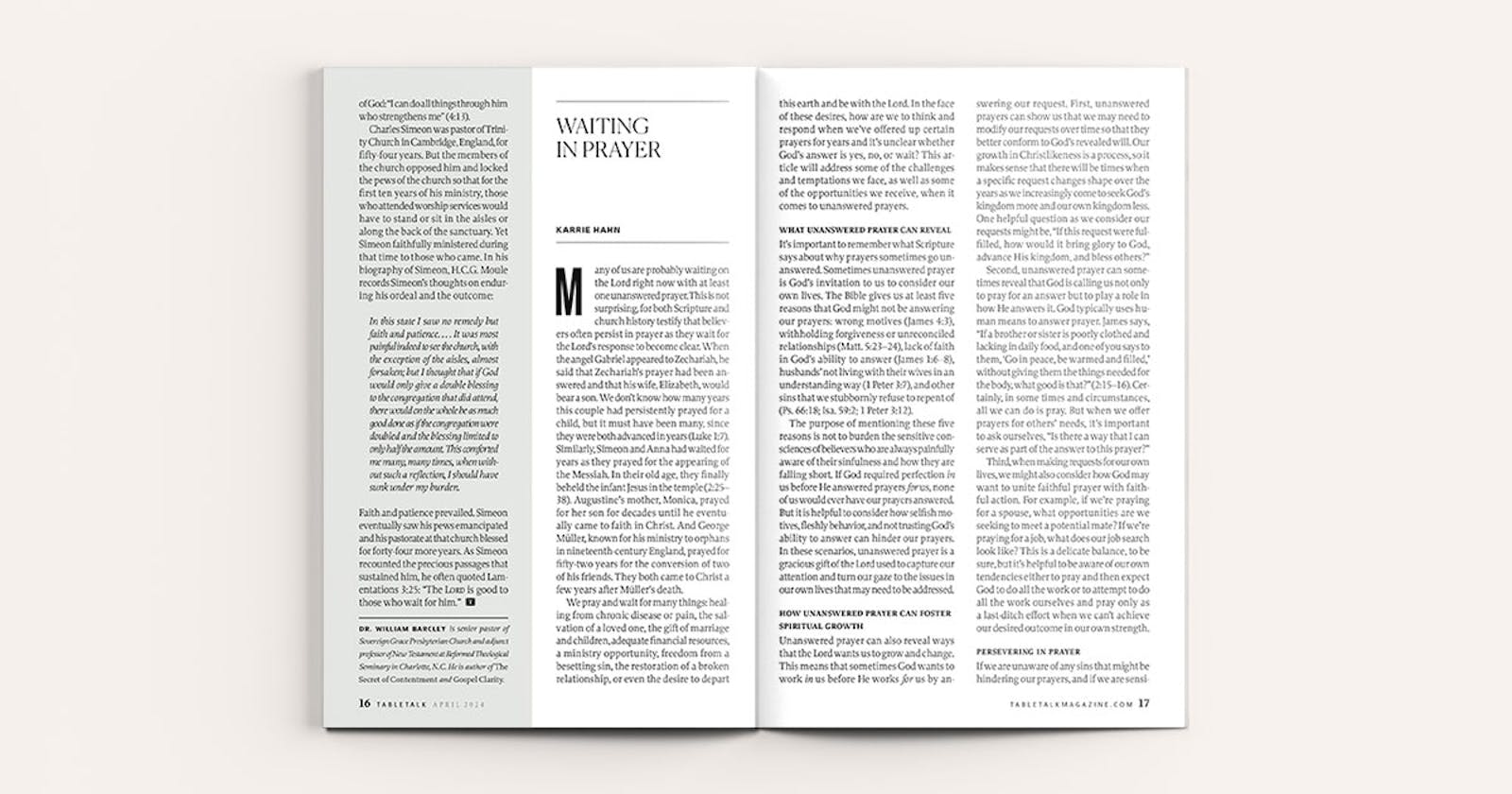
Request your free, three-month trial to Tabletalk magazine. You’ll receive the print issue monthly and gain immediate digital access to decades of archives. This trial is risk-free. No credit card required.
Try Tabletalk NowAlready receive Tabletalk magazine every month?
Verify your email address to gain unlimited access.
Many of us are probably waiting on the Lord right now with at least one unanswered prayer. This is not surprising, for both Scripture and church history testify that believers often persist in prayer as they wait for the Lord’s response to become clear. When the angel Gabriel appeared to Zechariah, he said that Zechariah’s prayer had been answered and that his wife, Elizabeth, would bear a son. We don’t know how many years this couple had persistently prayed for a child, but it must have been many, since they were both advanced in years (Luke 1:7). Similarly, Simeon and Anna had waited for years as they prayed for the appearing of the Messiah. In their old age, they finally beheld the infant Jesus in the temple (2:25–38). Augustine’s mother, Monica, prayed for her son for decades until he eventually came to faith in Christ. And George Müller, known for his ministry to orphans in nineteenth-century England, prayed for fifty-two years for the conversion of two of his friends. They both came to Christ a few years after Müller’s death.
We pray and wait for many things: healing from chronic disease or pain, the salvation of a loved one, the gift of marriage and children, adequate financial resources, a ministry opportunity, freedom from a besetting sin, the restoration of a broken relationship, or even the desire to depart this earth and be with the Lord. In the face of these desires, how are we to think and respond when we’ve offered up certain prayers for years and it’s unclear whether God’s answer is yes, no, or wait? This article will address some of the challenges and temptations we face, as well as some of the opportunities we receive, when it comes to unanswered prayers.
what unanswered prayer can reveal
It’s important to remember what Scripture says about why prayers sometimes go unanswered. Sometimes unanswered prayer is God’s invitation to us to consider our own lives. The Bible gives us at least five reasons that God might not be answering our prayers: wrong motives (James 4:3), withholding forgiveness or unreconciled relationships (Matt. 5:23–24), lack of faith in God’s ability to answer (James 1:6–8), husbands’ not living with their wives in an understanding way (1 Peter 3:7), and other sins that we stubbornly refuse to repent of (Ps. 66:18; Isa. 59:2; 1 Peter 3:12).
The purpose of mentioning these five reasons is not to burden the sensitive consciences of believers who are always painfully aware of their sinfulness and how they are falling short. If God required perfection in us before He answered prayers for us, none of us would ever have our prayers answered. But it is helpful to consider how selfish motives, fleshly behavior, and not trusting God’s ability to answer can hinder our prayers. In these scenarios, unanswered prayer is a gracious gift of the Lord used to capture our attention and turn our gaze to the issues in our own lives that may need to be addressed.
how unanswered prayer can foster spiritual growth
Unanswered prayer can also reveal ways that the Lord wants us to grow and change. This means that sometimes God wants to work in us before He works for us by answering our request. First, unanswered prayers can show us that we may need to modify our requests over time so that they better conform to God’s revealed will. Our growth in Christlikeness is a process, so it makes sense that there will be times when a specific request changes shape over the years as we increasingly come to seek God’s kingdom more and our own kingdom less. One helpful question as we consider our requests might be, “If this request were fulfilled, how would it bring glory to God, advance His kingdom, and bless others?”
Second, unanswered prayer can sometimes reveal that God is calling us not only to pray for an answer but to play a role in how He answers it. God typically uses human means to answer prayer. James says, “If a brother or sister is poorly clothed and lacking in daily food, and one of you says to them, ‘Go in peace, be warmed and filled,’ without giving them the things needed for the body, what good is that?” (2:15–16). Certainly, in some times and circumstances, all we can do is pray. But when we offer prayers for others’ needs, it’s important to ask ourselves, “Is there a way that I can serve as part of the answer to this prayer?”
Third, when making requests for our own lives, we might also consider how God may want to unite faithful prayer with faithful action. For example, if we’re praying for a spouse, what opportunities are we seeking to meet a potential mate? If we’re praying for a job, what does our job search look like? This is a delicate balance, to be sure, but it’s helpful to be aware of our own tendencies either to pray and then expect God to do all the work or to attempt to do all the work ourselves and pray only as a last-ditch effort when we can’t achieve our desired outcome in our own strength.
persevering in prayer
If we are unaware of any sins that might be hindering our prayers, and if we are sensitive to the ways that unanswered prayers can be used by God to mature us, how do we then persevere in prayer without giving up or losing heart?
One way is to avail ourselves of the prayer that our Lord Jesus taught us. Praying and meditating on the Lord’s Prayer in its entirety can fortify our faith and anchor us in truth as we wait for the Lord to answer specific requests. Each statement and petition of the Lord’s Prayer can remind us of what is true about God and about ourselves and can conquer the temptations and doubts that Satan throws our way when prayers go unanswered.

When we pray, “Our Father in heaven” (Matt. 6:9), we are encouraged to remember that God is the ultimate good Father and that He therefore cares for and loves us deeply. He is the ultimate source of all provision. We’re called to remember that He is always worthy of our trust and will always do what is just (Gen. 18:25; Rom. 9:14). We’re reminded that because He is in heaven, all power, authority, and sovereignty belong to Him. When troubled and fearful thoughts arise in our hearts that perhaps God isn’t answering because He doesn’t care about us, or doesn’t have our best interest in mind, or can’t be bothered with us or our requests, this line from the Lord’s Prayer challenges our doubts head-on by inviting us to reflect on everything that the Bible says is true of God’s posture toward His children. By remembering and declaring the character of our Father in heaven, we press on, believing that our prayers haven’t yet been answered not because God doesn’t care about us but precisely because He cares for us more than we can comprehend.
When we pray, “Hallowed be your name. Your kingdom come, your will be done, on earth as it is in heaven” (Matt. 6:9–10), we are invited to reorient any self-focused desires, agendas, and goals and to seek to align them with His kingdom purposes. We are reminded that there is an eternal world much bigger than the temporal world before our eyes, and we are challenged to remember that the God of the universal and eternal kingdom certainly knows how to best answer our prayers as we’d ask Him to answer them if we knew everything that He knows. We remember that only He sees the end from the beginning (Isa. 46:10), and we stand in the assurance that our prayers will eventually be answered in a way that reflects His wise and good omniscience, which we as limited creatures lack. We simply don’t have the ability to understand all the eternal implications of our prayers, the timing in which God answers them, and the way that He answers them. Yet amid our pain and bewilderment, we learn to pray to the Father as Jesus did, “Nevertheless, not my will, but yours, be done” (Luke 22:42), trusting that His will is good, even if from our temporal point of view that doesn’t appear to be the case.
When we pray, “Forgive us our debts” (Matt. 6:12), we’re reminded that God has already forgiven all our trespasses and justified us because we are united to Jesus Christ through faith. We pray in Jesus’ name because we belong to Jesus. And because we belong to Jesus, our God loves to hear our prayers. God doesn’t view us or our prayers as an inconvenience or an annoyance, but rather, He invites us to cast all our cares on Him (1 Peter 5:7). And while a delayed answer or an answer of “no” might tempt us to think that God wants to withhold good from us, the cross of Christ reminds us that such a notion is impossible (Rom. 8:32). Since forgiving all our debts cost the Son of God so much, we can be sure that God is for us and will graciously give us all things that are truly for our good.
When we pray, “Lead us not into temptation, but deliver us from evil” (Matt. 6:13), we remember that the evil one, Satan, wants to weaponize unanswered prayer to sow seeds of distrust in our hearts concerning the goodness of God. We’re reminded not to be ignorant of his schemes (2 Cor. 2:11) but rather by God’s grace to use unanswered prayer as a tool to draw us closer in communion with the Lord rather than letting it turn us away from Him. After all, one of Satan’s favorite tactics is to tempt us to doubt God’s character when we face circumstances that appear to contradict that character (see Gen. 3:1, 4–5; Job 1:9–11).
Finally, as we persevere in unanswered prayer, we have the promise and assurance that our Lord Jesus and the Holy Spirit are praying for us with the perfect knowledge that we lack. Jesus ever lives to make intercession for us (Heb. 7:25), and the Holy Spirit intercedes for us with groanings too deep for words (Rom. 8:26). Therefore, we can persevere in prayer because God is ultimately the One who is actively at work in the world, answering millions and billions of the prayers of His people in every era of history in such a way that in eternity, we will marvel at the glorious and perfect providential ordering of all things and every prayer to which He responded, “Yes,” “No,” or “Wait.”
